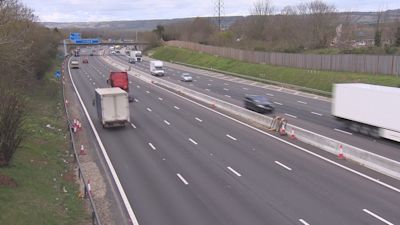Sheffield widow: Smart motorway pause just a 'sticking plaster'

A campaigner from Sheffield says she is "disappointed" that the government has only decided to pause the rollout of smart motorways.
Claire Mercer's husband Jason was killed on the all-lane section of the M1 near Sheffield in 2019 when he was hit by a lorry after stopping following a minor crash.
A coroner concluded that the lack of a hard shoulder contributed to Mr Mercer's death.
Claire Mercer said: "I'm disappointed. I always knew that it was going to be compromise and sticking plasters.
"It would have been so easy for them to turn off the first lane, even if they just do it whilst they investigate, just to turn off the first lane and you've effectively got the hard shoulder back."
Ms Mercer said that if a product is faulty it should be turned off whilst it is looked at for safety data, not just left on.
The Department for Transport on Wednesday said it will halt the rollout of new all-lane-running smart motorways - where the hard shoulder is used as a permanent live traffic lane - until it has collected five years of safety data for such schemes introduced before 2020.
But work will continue on stretches that are already under construction, as they are more than half completed, the Government said, noting that stopping progress on them now would cause disruption for motorists.
For existing smart motorways and those already being built, extra emergency refuge areas and technology to identify stopped vehicles will be added where possible.
The Department for Transport is committing £900 million to improve their safety, including £390 million to install 150 more emergency areas, representing around a 50% increase in places to stop by 2025.
Smart motorways were first introduced in England in 2014 as a cheaper way of increasing capacity compared with widening carriageways.
There are about 375 miles of smart motorway in England, including 235 miles without a hard shoulder.